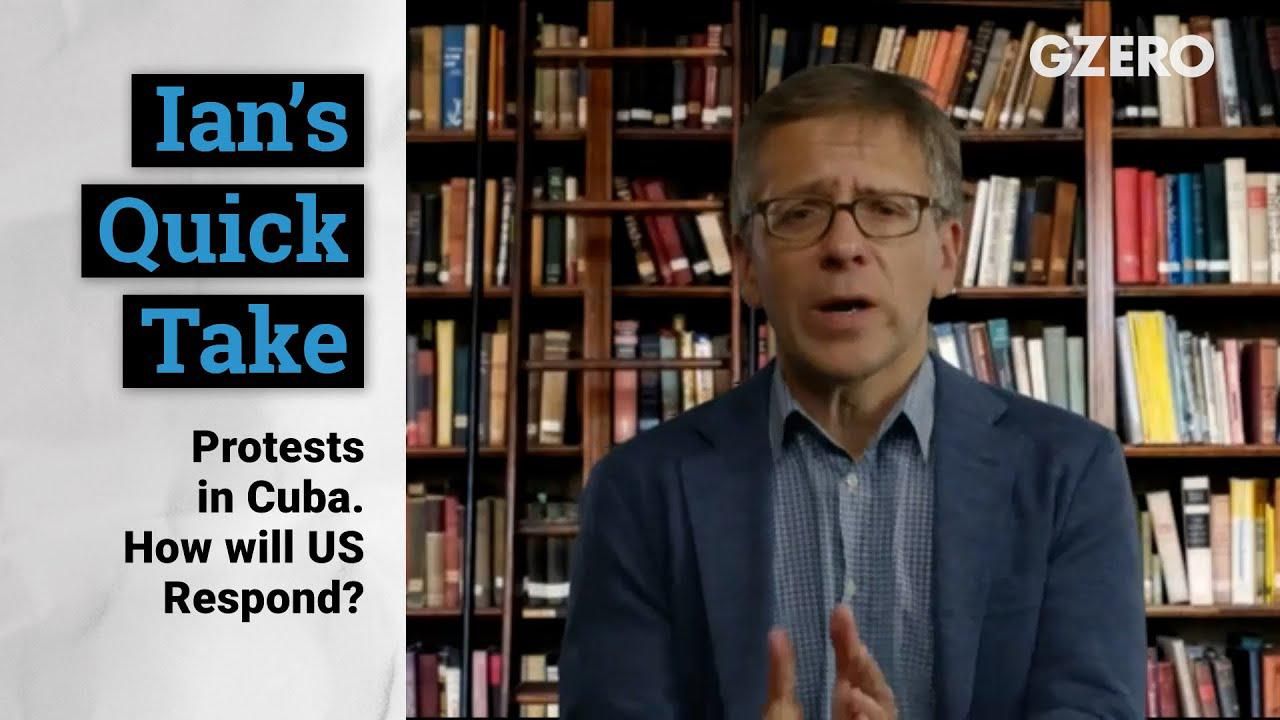
Ian Bremmer's Quick Take:
Hi, everybody. Ian Bremmer here, kicking off your week. A little Quick Take. Thought I would talk about Cuba, not a country we talk about all that often. Communist state, Raúl Castro just stepped down, and the biggest demonstrations across the entire country in decades. Talking about absence of vaccines, problems in healthcare, but also anger at the poverty, the economic mismanagement, the reality of the lack of liberty of living in a communist regime.
The Trump administration had put pretty significant sanctions back on after Obama tried to loosen up. I expect that this is going to make Cuba a bigger issue for lots of folks in the United States that would like to see the back of this Cuban regime. The question is, how does the United States try to address it? Does it shut the Cubans down even harder, make the country pay economically for the fact that they are treating their people so badly or does it use this as an opportunity to open up? I'll tell you.
I've actually done a fair bit of work on issues of sanctions and countries around the world, because there are two types of political stability. You have countries that are stable because they're open like Canada or Germany or Japan, or even the United States. And then you have countries that are stable because they're closed like Saddam Hussein's Iraq. Or like Gaddafi's Libya, or like Kim Jong-un's North Korea. And of course, Raúl Castro's Cuba. And if you are a country that is stable because you're closed, you generally want to stay closed. And the reason for that is because if suddenly you get lots of capital and movement of people and ideas and trade between your closed country and open countries around the world, the people inside your country want more liberty. It is harder to maintain political control in that environment.
We see that going on in Belarus with President Lukashenko. We've seen it going on in Cuba. It's why when the United States tries to move towards openness with Cuba, the Cuban government itself, they want the money, but they resist the idea of lots of foreign direct investment coming into Cuba because the United States is so much bigger. This is the advantage that the Americans have. It's not like the United States versus China, where you bring the Chinese into the WTO, but they're so large they still have the ability to maintain significant controls over what their people see and do and experience. And increasingly with technological controls surveilling the entire population, they can consolidate communist control even though there is a level of state capitalism and private engagement in China.
In the case of Cuba, opening up the borders would mean a massive amount of trade overwhelming what the Cuban government could have influence over a massive amount of tourism and the engagement with the average Cuban citizen would be much greater. I would argue that the reason why the communist regime has persisted for 62 years has precisely because they've been allowed to maintain isolation supported by the United States because of that sanctions regime. Lots of reasons for it, lots of Cuban emigres that were so angry at the Castro regime that would not tolerate any level of opening up of those sanctions, but those people are largely gone now.
There's a lot of private sector folks in the United States that would love to have access purely not because they're interested in liberty, but just because they want to make money in Cuba. I would argue that if you were able to take advantage of the size and scale of the American economy, its investment capacity, its trade capacity, its demand for things like Cuban medical expertise and the doctors and nurses that could serve the American market, I mean even the old Cuban vintage cars that would all be repaired and suddenly sold in the American market. The impact that would have for the Cuban political system would be immense. And I would suspect that you'd have a much quicker move towards regime change from the grassroots of the Cuban people, as opposed to the failed efforts by the CIA and others historically that never seemed to go all that well for the United States.
Anyway, something to think about. Certainly, a debate we're going to have in a more direct way in the United States because thousands of Cuban citizens are taking their lives in their hands by demonstrating across the country this weekend. Hope everyone's doing well, and I'll talk to you all real soon.
- Hard Numbers: Great Barrier Reef downgraded, Africa gets mRNA ... ›
- What We're Watching: Ethiopia's opposition crackdown, Cuba's food ... ›
- What We're Watching: Castro steps down, US sanctions Russia, a ... ›
- Returning Cuba to terror list is an 11th hour move by Pompeo and ... ›
- Biden and Merkel will talk China strategy; Cuban economic crisis - GZERO Media ›
- A rare revolt in Cuba - GZERO Media ›
- Biden’s Caribbean surprises - GZERO Media ›